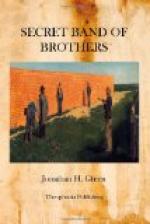Mr. Freeman exhibited a capital trick on the cards, quite equal to some of Mr. Green’s. But, said Mr. F., all such things were nothing—for, in gambling, playing on the square with fairness is the best policy. [Mr. Green admitted Mr. Freeman’s trick to be very superior—and it was at length understood that at the next meeting (on Saturday night) several of these mysteries would be shown on both sides.]
Mr. Green declared that he could show the principle of gambling to be a hundred per cent. worse than stealing.
The debate was listened to with much interest, and we learn that it will be closed to-morrow (Saturday) evening.
From the Evening Bulletin.
Messrs. Green and Freeman renewed their discussion last night, at the Chinese Museum, in the presence of a crowded audience, Leonard Jewell, Esq. in the chair. Mr. Freeman spoke first, and very modestly contended that none of his arguments of the previous evening had been answered by his opponent, but that, instead of this, painful anecdotes and stories had been told. He had quoted Scripture only to show that making stringent laws to punish gambling was contrary to the spirit of our Saviour’s teaching, viz. to return good for evil. This argument, will, of course, apply to all laws for the punishment of crime. Freeman went on to except to Green’s wholesale denunciations of all gamblers; it was well known that some were honourable men. There were a few bad ones, his opponent knew, and one, in particular, who on a certain occasion drew a bowie-knife to prevent a sum of money, fraudulently obtained, being returned to its proper owner. Green acknowledged that he was the man to whom Freeman alluded. He would not deny that he had been as guilty as the guiltiest.
Freeman continued by saying that he supposed his opponent would get over this by saying he had reformed. Green looked assent.
Freeman justified gambling by business operations, which were the result of chance, such as stock-jobbing; but we confess we cannot see where the parallel begins, the one being a clear matter of chance on both sides, the other, if Green’s stories be true, which we firmly believe, all on the side of the gambler, who cheats from the beginning to the ending of his playing, what with tricks of the trade, marked cards, &c. Freeman took the ground that gamblers were honest, and thus made out a better case than the facts will sustain.
Mr. Green’s reply was quiet and unaffected. He knew some gamblers who were straightforward and honourable in their playing. But the majority of the profession were dishonest, and the community was demoralized and impoverished by them. He admitted the story about the bowie-knife. He had never been disposed to conceal any of his wicked acts while one of the profession. There was one point on which all gamblers were unprincipled; they would play and win money of men they knew were totally ignorant of the arts of card-playing. This was a fraud—it was dishonest; a strong argument against the whole band, good or bad.




